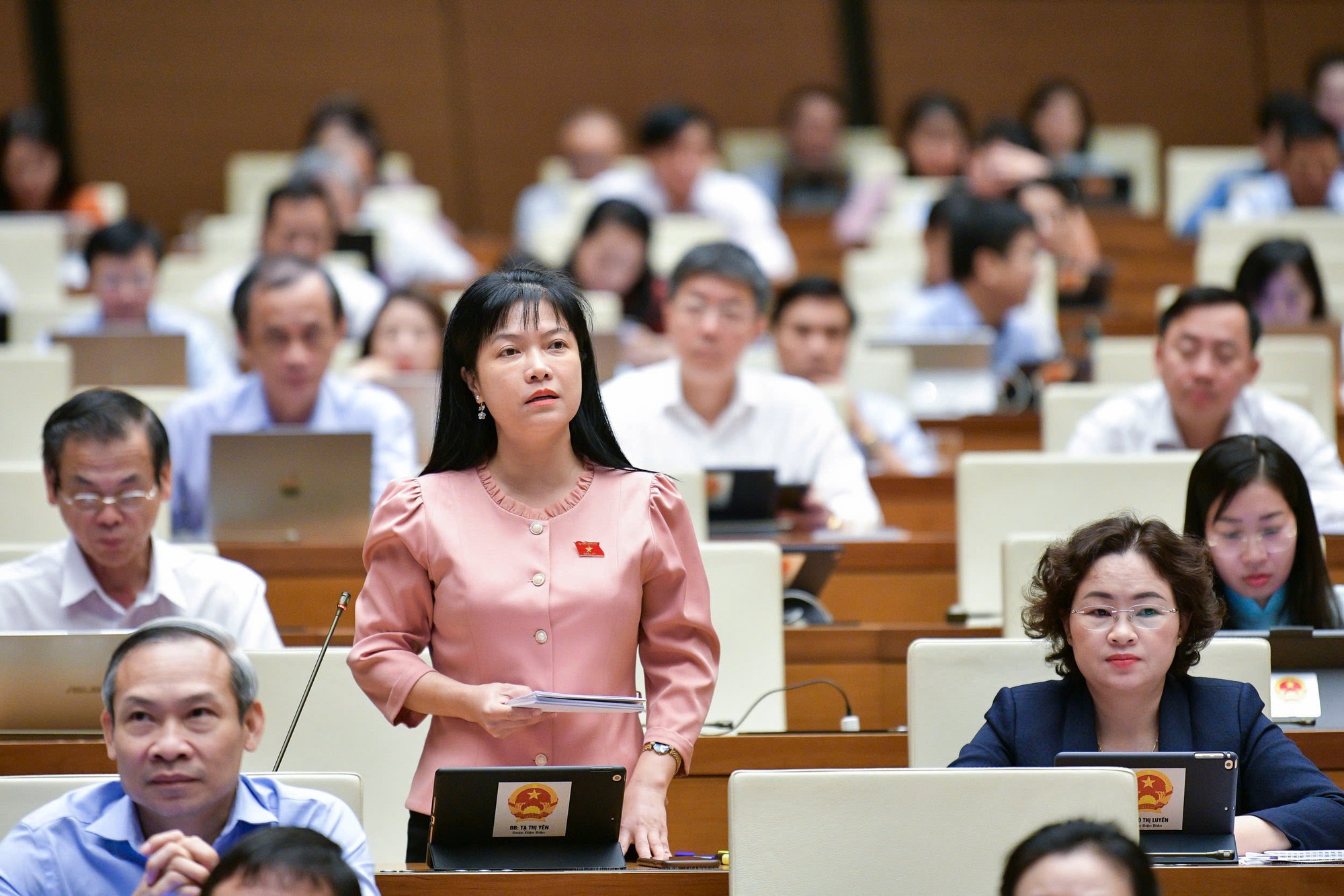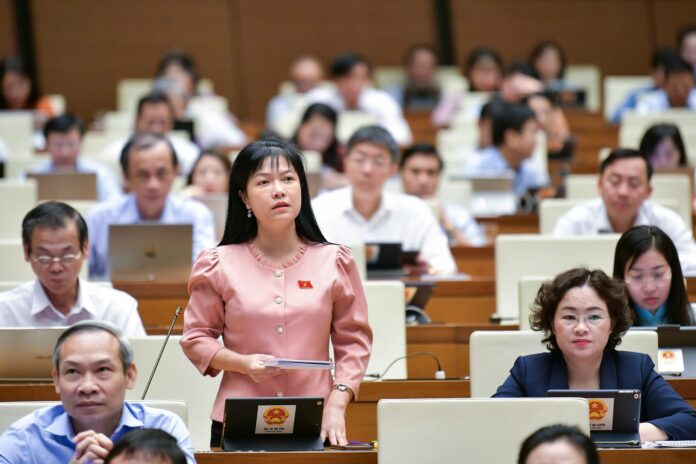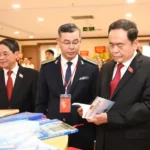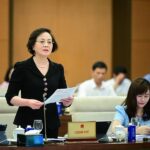The National Assembly (NA) resumed its 9th session on June 11th after a 10-day recess, during which NA agencies, the government, and relevant agencies reviewed and refined draft laws and resolutions.
Vietnam to Have 34 Provincial-Level Administrative Units
On the morning of June 11th, the NA will listen to the Minister of Home Affairs, on behalf of the Prime Minister, present a proposal on the merger of provincial-level administrative units. This proposal was submitted to the NA Standing Committee on June 5th.
Regarding the rearrangement, Minister of Home Affairs Pham Thi Thanh Tra stated that the government has developed 23 plans for the reorganization of 52 provincial-level administrative units to form 23 new ones. Eleven units will remain unchanged. As a result, Vietnam will have 34 provincial-level administrative units, including 28 provinces and six centrally-controlled municipalities.
“The results of public opinion polls and approvals by People’s Councils at all levels showed a high level of consensus. On average, 96.19% of people nationwide and 100% of People’s Councils at all levels of the 52 provinces and cities voted in favor of the proposal to rearrange their local administrative units,” said the Minister of Home Affairs.

Question and answer session at the 8th session of the 15th National Assembly. In the picture: NA Deputy Ta Thi Yen (Dien Bien delegation) questions the Minister of Information and Communications (former). Photo: LAM HIEN
Also on the morning of June 11th, the NA will listen to presentations on the following: the draft Law on Amending and Supplementing a Number of Articles of Laws in the Field of National Defense and Security; the investment policy for the construction of Ring Road 4 in Ho Chi Minh City; and the draft NA Resolution on piloting some special mechanisms and policies for the development of the railway system.
The NA will then discuss these issues in groups. On the same day, the NA will hold a plenary discussion on the draft Law on Amending and Supplementing a Number of Articles of the Law on Handling Administrative Violations.
On June 12th, the NA will hold a plenary discussion on the draft Law on Amending and Supplementing a Number of Articles of the Law on Issuing Legal Documents and the draft NA Resolution on extending the exemption of agricultural land use tax until 2030. On the same day, the NA will discuss in groups the draft NA Resolution on piloting some special mechanisms and policies for the development of the railway system, the draft Law on Railways (amended), and the draft Law on Emergency Status.
On June 13th, the NA will discuss the proposed NA supervision program for 2026. Subsequently, the NA will vote on the following draft laws: Law on Special Consumption Tax (amended); Law on Enterprise Income Tax (amended); Law on Teachers; Law on Employment (amended); and Law on Amending and Supplementing a Number of Articles of the Law on Advertising. The NA will also discuss at the plenary session the draft NA resolutions on: Waiving and supporting tuition fees for preschool, general education, and national education program students at educational institutions; and universal preschool education for 3- to 5-year-old children.
On June 16th, the NA will hold a second plenary discussion on the draft NA Resolution on amending and supplementing a number of articles of the 2013 Constitution; and the draft Law on Amending and Supplementing a Number of Articles of the Law on the Fatherland Front of Vietnam, the Law on Trade Unions, the Law on Youth, and the Law on Democracy at the Grassroots Level…
Question Time to Focus on Finance and Education
According to the expected program, the NA will spend one and a half days (from June 19th to the morning of June 20th) on questioning and answering questions from NA deputies. The Minister of Finance and the Minister of Education and Training are the two ministers selected for this session.
Specifically, on the morning of June 19th, Minister of Finance Nguyen Van Thang will answer questions related to financial solutions for socio-economic development, ensuring growth targets, renewing traditional growth drivers, and establishing and promoting new growth drivers.
The issues chosen for the questioning of the Minister of Finance also include solutions to improve the efficiency of state-owned enterprises; support and promote the development of the private sector as the most important driver of the economy; and attract more foreign direct investment. Mechanisms and policies to promote and attract investment in industrial parks and economic zones are also among the topics for questioning and answering.
Deputy Prime Minister Ho Duc Phoc and Deputy Prime Minister Nguyen Chi Dung, along with ministers of Industry and Trade, Agriculture and Environment, Construction, Science and Technology, and Foreign Affairs, will also participate in answering questions and providing explanations on related issues.
From 3:50 pm on June 19th to the morning of June 20th, Minister of Education and Training Nguyen Kim Son will answer questions about issues in the field of education and training. The questioning will focus on the current situation and solutions for developing and improving the quality of higher education to meet the demand for high-quality human resources and the requirements of socio-economic development.
The implementation of regulations on extra-curricular teaching and learning is also among the topics chosen for questioning the Minister of Education and Training. Other issues include ensuring a safe, healthy, and friendly educational environment; preventing school violence; and ensuring food safety in schools.
Deputy Prime Minister Le Thanh Long and ministers of Finance, Home Affairs, Health, Culture, Sports and Tourism, Science and Technology, and Public Security will also participate in answering questions and providing explanations on related matters.
From 10:20 am on June 20th, the Prime Minister (or a deputy prime minister authorized by the Prime Minister) will report on matters related to the government’s direction and then directly answer questions from NA deputies.
Discussion on Special Mechanisms After Reorganization
During the second session, the NA will spend almost a day and a half discussing the following issues in the hall: The implementation of the socio-economic development plan and the state budget in the first months of 2025; the transition to applying a number of special mechanisms and policies allowed by the NA to be implemented in some localities after the reorganization of the apparatus and the expansion of administrative boundaries in accordance with the Party and State’s guidelines. The NA will also discuss the practice of thrift and anti-waste in 2024.
“Chairman of the National Assembly Tran Thanh Man: Audit Activities are Increasingly In-Depth and High-Quality”
Emphasizing the outstanding achievements of the State Audit Office of Vietnam (SAV) in the past term, the National Assembly Chairman clarified that the SAV Party Committee has effectively played its role as the core leader. The committee has strengthened its leadership and directed officials and party members to enhance the quality and efficiency of their work.
The Future of Transportation: Vietnam’s Iconic Mountain Tunnel Project and Its Advanced Machinery
The Ngang Pass, immortalized in Vietnamese poetry, is undergoing a transformation. A tunnel, an engineering marvel, is being constructed to provide a safer and more efficient passage through this iconic landmark. This ambitious project promises to revolutionize travel, offering a seamless and captivating journey through the heart of Vietnam’s cultural heritage.
The First Vietnam – China Joint Venture in Aviation Takes Off on August 1st
Passengers traveling between Vietnam and China on this joint venture’s flights will be privy to enhanced amenities and benefits.
“A Streamlined Administrative System: Empowering Vietnam’s Progress”
With a unanimous approval rating, the National Assembly’s Standing Committee has passed in principle 34 resolutions on the rearrangement of communal-level administrative units for the year 2025. These resolutions, pertaining to 34 provinces and centrally-run cities post-merger, signify a pivotal step forward in administrative reform.





















